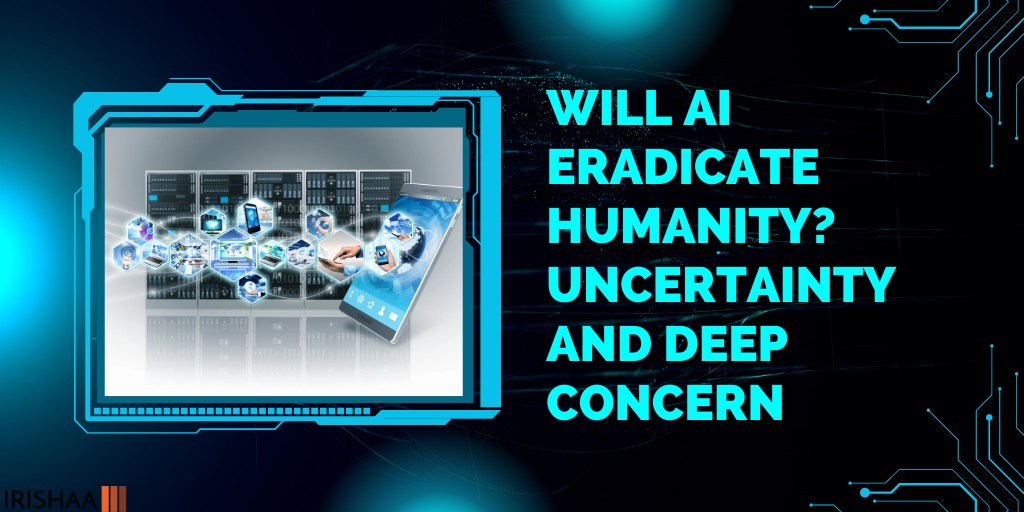Will AI Eradicate Humanity? Uncertainty and Deep Concern

Introduction
In a world where technology is advancing at an unprecedented pace, the emergence of Artificial Intelligence (AI) stands as one of the most remarkable innovations of our time. With its roots tracing back to the mid-20th century, AI has evolved from a conceptual dream into a tangible reality, permeating every aspect of our lives.
But with this monumental achievement comes a profound question that resonates in the hearts and minds of scientists, philosophers, policymakers, and the general public alike: Will AI eventually eradicate humanity, or will it serve as a tool to elevate us to new heights?
The question is not merely hypothetical. AI's rapid development and increasing capabilities have sparked both excitement and deep concern. On one hand, AI promises to revolutionize industries, enhance human capabilities, and possibly solve some of the world's most pressing problems. On the other hand, it raises serious ethical dilemmas, potential economic disruption, and even existential risks.
This article will explore the intricate landscape of AI, examining both its promise and peril. We'll delve into the rise of AI, the debates surrounding its potential opportunities and threats, the intersection of AI with human life, and the complex considerations for our future.
Join us on this thought-provoking journey as we explore the possibilities, the uncertainties, and the profound implications of AI. Whether a tool for unparalleled advancement or a harbinger of unforeseen consequences, AI's role in our future is a subject that demands careful reflection and discernment.
The Rise of AI
Artificial Intelligence (AI), once a concept limited to the realms of science fiction, has rapidly emerged as a central force in today's technological landscape. From personal assistants like Siri and Alexa to sophisticated systems that power medical diagnoses and financial predictions, AI is revolutionizing how we interact with the world around us.
The rise of AI can be traced back to the development of machine learning and deep learning algorithms that enable computers to learn from data and improve over time. It has empowered businesses and organizations to automate tasks, enhance efficiency, and unlock new opportunities for innovation.
With AI's rapid evolution, there is an increased investment in research and development, propelling it further into various domains of human life. However, this explosion of AI technologies is not without its concerns.
The Debate: Opportunity or Threat?
The rise of AI has ignited a fierce debate among scientists, policymakers, and the general public about its potential impact on humanity. On one side, proponents argue that AI presents unparalleled opportunities. They see it as a catalyst for economic growth, medical advancement, and societal progress. With AI's help, we can tackle some of the world's most pressing challenges, from climate change to global health crises.
On the other side of the debate are those who view AI with deep concern and caution. The fear is that uncontrolled and poorly understood AI systems could lead to job displacement, increased inequality, and even existential risks. Could AI become too intelligent, outsmarting its human creators? Could it be used maliciously or irresponsibly, leading to unforeseen consequences?
This dichotomy has made the discussion around AI one of the most polarizing and intriguing subjects of our time. The quest to understand and harness AI's potential, while also grappling with its risks and uncertainties, is a complex task that demands careful consideration and balanced dialogue.
In the sections that follow, we will explore both the promises and perils of AI, delving into its applications, ethics, regulation, and the various perspectives that shape our understanding of this transformative technology.
Understanding AI: A Brief Overview
Definition and Components
AI, or Artificial Intelligence, refers to the development of computer systems that can mimic human intelligence and perform tasks such as problem-solving, decision-making, language understanding, and more. The key components of AI include algorithms, data, and computing power, all working together to create a system that learns and adapts over time.
Types and Applications
AI can be segmented into two primary classifications:
Narrow AI: These systems excel in performing specific tasks and are designed for particular applications. Examples include speech recognition systems, chatbots, and targeted advertising algorithms.
General AI: A more ambitious goal, General AI aims to develop systems that possess intelligence comparable to human beings, able to understand and perform any intellectual task that a human can.
Applications of AI span various industries and sectors. From healthcare, where AI can analyze medical imaging, to transportation, where autonomous vehicles rely on AI, the reach of this technology is immense.
The Intersection of AI and Human Life
AI is no longer limited to the domains of technology companies or research labs. It has permeated our daily lives, shaping how we interact, work, and even think. Whether it's personalized recommendations on streaming platforms, facial recognition in security systems, or virtual teaching assistants, AI's intersection with human life is becoming increasingly profound.
AI: The Promise
Enhancing Human Capabilities
One of AI's most exciting promises is its potential to augment human abilities. Through AI-powered tools, humans can analyze vast amounts of data, make more accurate predictions, and even enhance creativity by providing new insights and perspectives.
Revolutionizing Industries
AI has the potential to transform entire industries, making them more efficient and effective. In manufacturing, AI-driven robots can optimize production lines. Within the realm of finance, AI algorithms have the capability to forecast market trends. The possibilities are endless, and businesses worldwide are investing heavily in AI to stay ahead of the competition.
Social and Economic Benefits
Beyond the individual or organizational level, AI offers potential social and economic benefits. It can contribute to solving global challenges such as poverty, hunger, and environmental sustainability. By automating routine tasks, AI can free up human resources for more meaningful work, potentially leading to a higher quality of life.
AI: The Peril
Unemployment and Economic Disruption
While AI offers efficiency and automation, it also poses a significant risk of unemployment. As machines take over routine tasks, many jobs may become obsolete, leading to economic disruption and social unrest. The transition requires thoughtful planning, retraining, and social support systems to mitigate these challenges.
Bias and Discrimination
AI algorithms learn from existing data, and if that data contains biases, the AI system may inadvertently perpetuate or even exacerbate those biases. Issues such as racial, gender, or socio-economic discrimination can become embedded in AI systems, leading to unjust outcomes in areas like hiring, lending, or law enforcement.
Security Risks
The integration of AI into critical systems poses new security risks. From hacking autonomous vehicles to manipulating recommendation systems, malicious actors can exploit AI in ways that threaten both individual privacy and national security.
Ethical Dilemmas
AI's decision-making processes can lead to ethical dilemmas. In the context of a self-driving car, should the emphasis be on the safety of its passengers or pedestrians? How do we ensure that AI's recommendations align with our moral values? These questions require deep philosophical considerations and a comprehensive ethical framework.
Regulation and Control of AI
National and International Perspectives
Regulating AI is complex due to its global nature and rapid evolution. Nations are grappling with creating frameworks that balance innovation and ethics. International collaboration is essential to create standards that transcend borders and address global challenges.
Ethical Frameworks and Guidelines
Various organizations and governments are developing ethical frameworks to guide AI development. These guidelines focus on principles like transparency, fairness, accountability, and human-centric design. They aim to create a shared understanding of ethical AI and to encourage responsible development.
The Role of Private Sectors
Private sectors play a critical role in shaping AI's future. From technology giants to startups, the private sector drives innovation but also faces the responsibility to develop AI ethically. Collaboration between governments, academia, and private sectors is vital to create a balanced ecosystem where AI can thrive without compromising societal values.
AI presents a compelling dichotomy of promise and peril. Its potential to enhance human capabilities, revolutionize industries, and contribute to social well-being is immense. However, the risks of unemployment, bias, security threats, and ethical dilemmas cannot be ignored.
The path ahead requires careful navigation, involving thoughtful regulation, ethical frameworks, collaboration across sectors, and a deep understanding of AI's potential and pitfalls. The journey towards integrating AI into our lives is as thrilling as it is challenging, offering a future full of possibilities and uncertainties.
The Future: Hope or Despair?
The future of AI is marked by both optimism and caution. The direction we take depends on our choices, regulations, ethical considerations, and collaboration across sectors.
Expert Opinions and Predictions
Leading AI researchers, technologists, and thinkers offer a wide array of predictions. Some envision a future where AI solves complex problems, from curing diseases to combating climate change. Others warn of a dystopian path where AI exacerbates inequality, reduces human autonomy, and poses existential risks. These contrasting views reflect the complex nature of AI and its potential to shape our future in profound ways.
A Balanced Perspective
A balanced perspective acknowledges both the transformative power of AI and the inherent risks. It seeks to harness AI's potential while implementing safeguards to prevent or mitigate negative outcomes. This approach requires ongoing dialogue, research, ethical considerations, and adaptability to the ever-changing landscape of AI.
Conclusion: Reflections and Final Thoughts
As we reach the end of this exploration into the fascinating world of Artificial Intelligence (AI), we find ourselves at a crossroads filled with promise, uncertainty, and deep concern. The journey through the rise, potential, risks, and ethical considerations of AI has unveiled a landscape rich in complexity and contradictions.
AI's unprecedented potential to enhance human capabilities, revolutionize industries, and contribute to social and economic benefits cannot be overstated. It presents an exciting frontier that could redefine how we live, work, and interact. But as with all great innovations, the promise is twinned with peril.
The concerns surrounding unemployment, economic disruption, bias, discrimination, security risks, and ethical dilemmas are not merely speculative; they are tangible challenges that require urgent attention. The balance between technological advancement and the preservation of human values, safety, and well-being is a delicate one. It demands cooperation and vigilance from governments, private sectors, experts, and society at large.
The future of AI and its relationship with humanity is an enigma, neither confined to utopian visions nor dystopian fears. It is a future that we, as a collective, have the power to shape. Whether AI becomes a force for unparalleled human advancement or a cause for eradication depends on the choices we make, the values we uphold, and the precautions we take.
As we stand on the brink of a new era, let us approach the AI frontier with a spirit of inquiry, responsibility, and ethical discernment. The road ahead is uncharted, filled with both hope and caution. Our actions today will determine whether AI serves as a harmonious partner in our shared journey or a disruptor that alters the course of human destiny.
AI's integration into our lives is not a distant future scenario but an ongoing process. Every step we take should be guided by wisdom, empathy, ethics, and a keen awareness of the potential ramifications.
The reflections on AI's potential impact on humanity are not conclusions but the beginning of an ongoing dialogue—a dialogue that invites us all to participate, ponder, and prepare for a future that is still unfolding.
We stand on the cusp of an era where AI has the potential to redefine what it means to be human. The challenge and opportunity lie in shaping this technology in a way that aligns with our highest ideals and deepest values.
It's a journey filled with uncertainty, but also one filled with the promise of discovery, growth, and a deeper connection to the very essence of what it means to be human.


